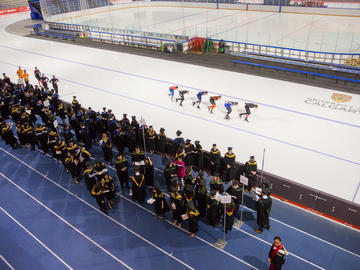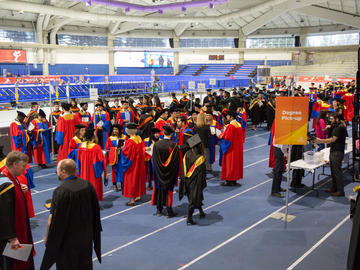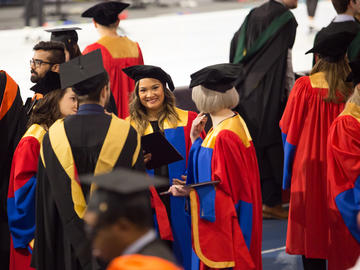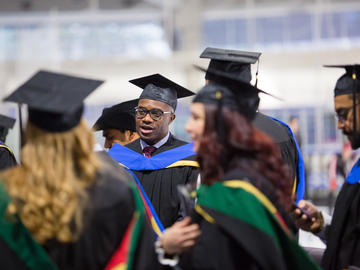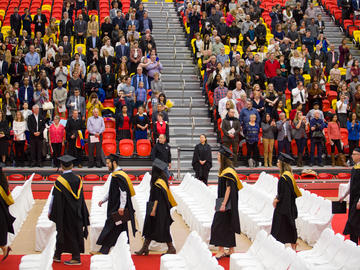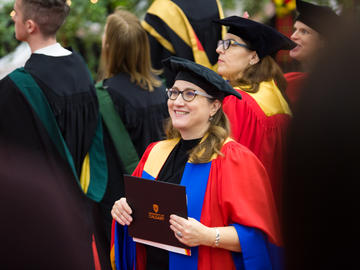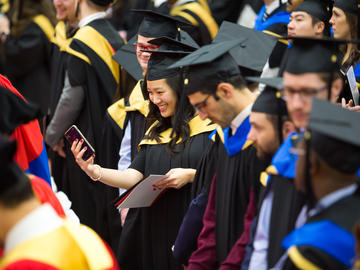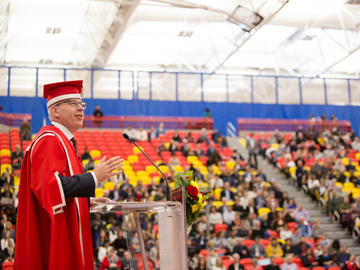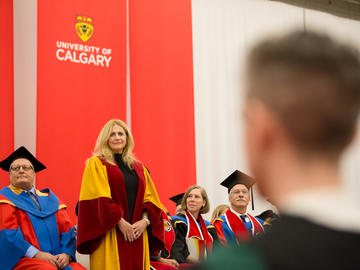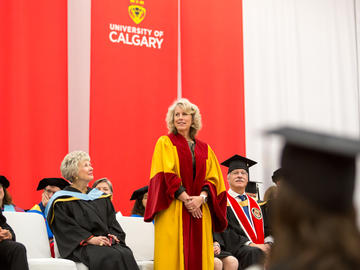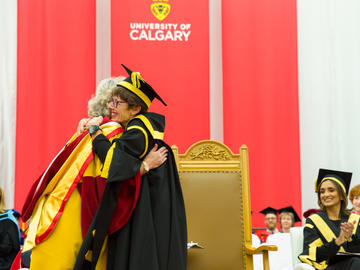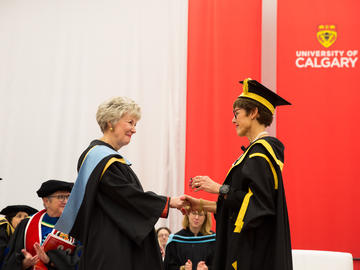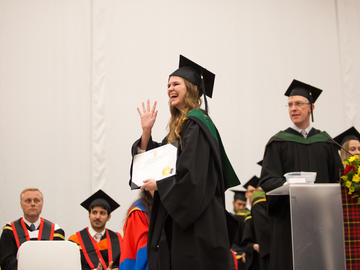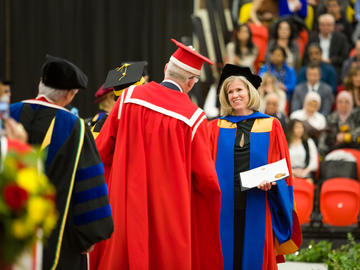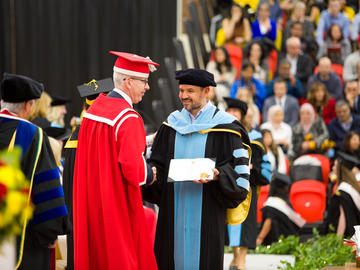Nov. 12, 2019
Class of 2019: First-ever Entrepreneurial PhD develops wearable technologies for Microsoft

By the time Teddy Seyed is conferred with his PhD at convocation on Nov. 15, he will already have firm footing as an entrepreneurial postdoctoral researcher at Microsoft Research (MSR) near Seattle.
The Calgary native — who has been passionate about design and creativity for as long as he can remember — has turned his natural curiosity into a career, and is the first Entrepreneurial PhD graduate at the University of Calgary.
Entrepreneurial environment sparked creative process, built confidence
While Seyed says he was naturally more interested in art, and saw computer science as strictly technical, his perspective changed once he was introduced to human-computer interaction (HCI) courses in the third year of his undergraduate studies in computer science.
“It took me a while to even understand programming,” he explains. “But I eventually got really good at it because of the creative side. When I was introduced to human-computer interaction, the design side of computer science, it was fantastic, because I could design things and make them, too. It brought everything together; the whole process, and seeing a visual output, really clicked with me.”
When looking for internships to do during his last years of his undergraduate degree, Seyed was introduced to the lab of Dr. Frank Maurer, PhD. Mauer's blend of creativity and technology sparked Seyed’s innovative tendencies as he began his graduate studies and quickly began creating and developing interactive technology projects. It was during this time that Seyed became increasingly interested in entrepreneurship.
“During my master's, I was also working for a startup with my supervisor, Frank, so I was getting exposed to the business side. One of the great things about working in Frank’s lab was that you got practice pitching and doing demonstrations for different companies. It was hard at the beginning, but I got much better at it. By the time I went to work for a startup, I was already good at dealing with customers and clients. Seeing things on the business side, I figured I’d try it for myself.”
After meeting business partner Rana Varma at a Calgary maker-space, Seyed figured he would push his business skills in electronics, and come back to focus on research after trying his hand at entrepreneurship. Together, they developed Slate Scale, a food scale connected to a mobile app that could read and display nutritional information after food is placed on the scale’s surface. While limited funding led to the need to discontinue Slate Scale’s development, Seyed considers that time a “very good experience.”
“I move quickly,” he says. “I’m OK with failure and moving on. In fact, most of the entrepreneurial stuff didn’t succeed in the way I wanted it to. Dealing with that used to be really hard, but the point is to learn. The University of Calgary is a really safe environment to learn and test out entrepreneurial skills, so I learned that it was OK to fail in this context."
If you don’t fail, you don’t get better. It’s super cheesy, but it makes a lot of sense once you go through it.
Seyed continued to complete an Entrepreneurial PhD in Computer Science, which will be conferred to him at the November 2019 convocation ceremony. During his PhD studies, he did back-to-back internships at MSR, developing and leading Project Brookdale. Brookdale is a platform that includes both hardware and software and makes it easier for fashion designers and companies to create and embed different types of technologies into their designs.
Microsoft Research later invited him to join as a postdoctoral researcher to continue his innovations in wearable and fashion technology, among several other areas. For both Seyed and Microsoft Research, the experience was inspiring, especially with his research and entrepreneurial approach.
“It works really well, because research and entrepreneurship are basically the same thing, if you think about it," Seyed says. "On the research side, you build a prototype. On the entrepreneurial side, if you’re doing tech, you do the same thing — build a prototype. Then you validate it. The outcome on the research side is publishing a paper or some scholarly work; on the entrepreneurial side, it’s a product or a pitch. The process is the same, but the output is different. Realizing that was the 'a-ha' moment for me.”

A model shows off a wearable tech garment in the sold-out Project Brookdale runway show
Kristen Blush
Passion for innovation inspires empowerment and inclusion
Although he will be living in the United States, Seyed plans to keep ties to his hometown and home country.
While he was finding success in his entrepreneurial endeavours, Seyed wanted to explore how he could have impact beyond doing research. He founded a not-for-profit, Stories of Fashion, Inclusion, and Empowerment (SOFIE), with a multicultural group of artists, designers and technologists to increase and promote diversity in technology and other fields by fusing culture, fashion, and technology.
“We came up with the idea of teaching wearable tech to Indigenous youth, specifically around regalia. Regalia for the powwow is for all genders, both young and old, and they’re worn at shared community events and other places, so it’s a great application.
"We worked with eight young girls from the Mi’kmaq community in Nova Scotia. Their mothers and other elders joined them, and we taught them about wearable tech. The girls picked it up really quickly, and were using it to discuss aspects of culture and purposes of the garment with their parents,” Seyed says.
“It went so well that one of the girls literally ran home — bolted out of the room — brought her garment and put tech into it. They took it around Nova Scotia after being donated money by the community to travel around and take these garments to local powwows. It was fantastic, and they were the stars of the show. It allowed them to tell their stories and culture in an entirely new medium.”
As he cements his place as a leader in the wearable tech world, and at MSR, Seyed plans to continue SOFIE, periodically returning to Calgary as he refines how to scale it; he plans to lead summer camps, and inject a little more entrepreneurial spirit.
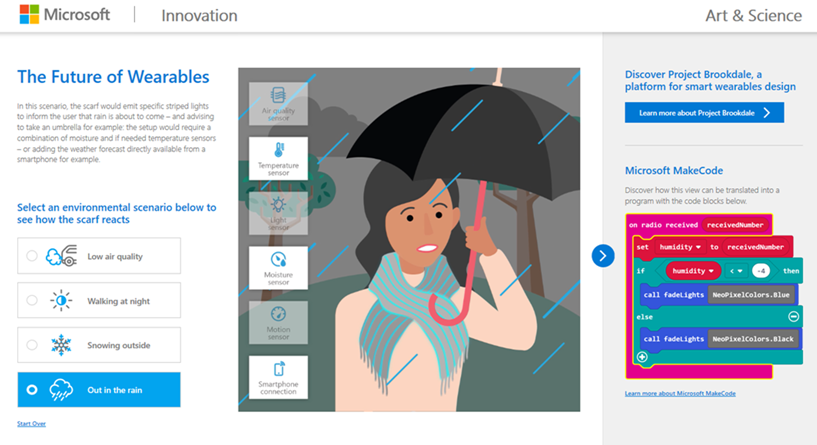
Seyed's team at Microsoft has created an entirely customizable environmentally sensing scarf.
Microsoft
“Part of the reason I did a not-for-profit is because I wanted to maintain something in Calgary. If you want to change the world, you change home first. I want to do a lot out in the world, but I can do a lot here right now. So why not?”
Seyed says Maurer, Dr. Tony Tang, PhD, his labmates, the Hunter Hub for Entrepreneurial Thinking, and the Faculty of Science were important factors in his growth as an innovator and entrepreneur.
“I’ve been lucky to continue along the entrepreneurial path here, and a lot of people at the university helped pave the way. It’s a very safe environment to be uncomfortable and learn. I couldn’t have done the things I did anywhere else. It’s something that’s very unique to here.”
Work in wearable tech already underway
While Seyed is still a new postdoc at MSR, his experience has let him hit the ground running. Beginning in mid-October 2019, he began working on a project for "The Future of Wearables", part of a newly launched innovation initiative at Microsoft. His creation builds off some of the work he had done in his internship. "We made a pretty cool environmentally sensing scarf that is entirely user customizable to show off the platform." Seyed explains. "It's what I was trying to work towards near the end of the PhD. I'm quite pleased with how it turned out!"

